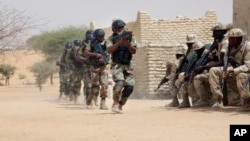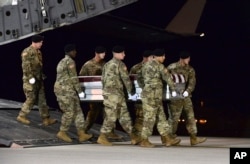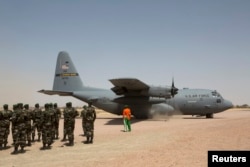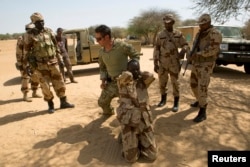The deaths of four U.S. Special Forces soldiers in Niger last month have raised questions about America’s role in the fight against violent extremism in a sparsely populated region of Africa.
Before the October attack, in which at least four Nigerien soldiers were also killed, some members of Congress said they were aware of U.S. operations in Niger, but others - including Sen. Lindsey Graham (R-South Carolina), and Sen. Chuck Schumer, (D-New York) - said they did not know U.S. troops were on the ground in Niger.
U.S. involvement includes more than 800 troops, according to Pentagon officials. There are also two drone bases in the country.
Niger and Burkina Faso want the U.S. to do more to support local governments in their fight against extremism, mainly by funding a new regional task force. The first-year operating budget for the five-nation force has been projected at $500 million. The United States is considering making a contribution of $60 million.
A decade of involvement
The heightened U.S. presence in the Sahel dates back to at least 2007, when the Pentagon established the United States Africa Command, AFRICOM. The command, based in Stuttgart, Germany, works with regional partners in Africa to strengthen security and stability. Since at least 2013, U.S. forces have conducted missions to train, advise and assist in Niger, collaborating with local authorities to clamp down on armed extremists.
Niger has been a particularly important strategic partner in the region. During the Obama administration, the U.S. built drone bases in the capital, Niamey, and in the northern city of Agadez.
“Because the government of Niger has been a strong ally to the counterterrorism efforts, it’s been natural for the United States to station its counterterrorism forces in that country,” said Lisa Mueller, an assistant professor of political science at Macalester College in St. Paul, Minnesota.
But the Green Berets' deaths have brought new scrutiny to U.S. partnerships in the Sahel, and it is unclear how - or if - the Trump administration might shift its policy in the region.
Some activists and U.S. lawmakers are concerned that some regional partners have authoritarian governments. Even Niger, said Brandon Kendhammer, an associate professor and director of the International Development Studies Program at Ohio University, is “problematically democratic.”
Still, Kendhammer characterized U.S. involvement as a net positive. “It’s pretty clear that these investments do make a real difference in the ability of the region to provide its own security,” he said.
Seeking input has been key to that success, according to Kendhammer. Despite perceptions among some observers that AFRICOM works unilaterally, the command has a track record of seeking local expertise and wide-ranging perspectives, Kendhammer said.
Green Beret deaths
Pentagon officials expect to complete their investigation into the Niger attack in January.
Based on what is now known, the U.S. soldiers killed last month were involved in exactly the kind of work that troops stationed in the Sahel undertake, Kendhammer said.
A big part of that role involves training local forces via workshops and fieldwork. Training can cover everything from basic operations to advanced tactics, including rapid response to terrorist attacks. To maximize their impact, the U.S. follows a “train the trainer” model, Kendhammer said, working with elite local forces who, in turn, share knowledge and skills.
No one has claimed responsibility for the October attack, but the Pentagon suspects possible involvement by militants affiliated with the Islamic State group, one of several extremist organizations operating in the Sahel.
That presence typically involves local militants who pledge allegiance to an international organization like IS or al-Qaida. Such an affiliation might signal tenuous ties - occasional mention in an IS publication, for example - or ongoing communication with the broader network.
Either way, affiliating with an established terrorist organization can be more pragmatic than ideological. According to Kendhammer, the particular group alleged to be behind the Niger attack was previously affiliated with al-Qaida and switched in 2015 or 2016 to find a better strategic partner.
The tactics employed by local militants hinge on undermining U.S. efforts. As VOA previously reported, it is likely that villagers in Tongo Tongo, where last month's attack occurred, helped lure U.S. and Nigerien forces into a trap. The villagers’ willingness to assist militant groups reflects concerted efforts within those factions to build trust with local populations while fomenting contempt for America.
Daily Beast contributor Philip Obaji Jr. reported this month that residents of Tongo Tongo blamed the U.S. for a 2016 grenade attack that killed six children. No evidence has linked the U.S. to the incident, but local militant groups have pushed the narrative of an American-led slaughter to “win the hearts and minds of the local population,” Obaji wrote.
Financial constraints
Governments in the Sahel say they need far more funding to carry out critical missions tied to two task forces: the newly formed G5 counterterrorism force, and the Multinational Joint Task Force, a longstanding effort based in Chad that has been revitalized to fight Boko Haram.
Burkina Faso’s minister of foreign affairs, Alpha Barry, told VOA’s French to Africa service this month that the G5 force needs more help from the U.S., whose recent pledge will assist regional militaries but not the G5, according to Barry.
Despite its bases and troop deployments, U.S. investment in the Sahel, particularly in Mali and Niger, has so far been eclipsed, both financially and militarily, by the EU and France, Mueller said.
Local solutions
Concerns about lack of funding and efforts to demonize the U.S. may have a common solution: more local initiatives and buy-in. But bringing those solutions to fruition is easier said than done.
“In U.S. government discourse about West Africa, [we tend] to talk about the need for everything to be regionally oriented and for everything to be an African solution to an African problem. And those are good ideas in principle, but they don’t always translate directly into obvious policy,” Kendhammer said. “Not every regional initiative is going to be the right regional initiative. Not every local solution is going to be the local solution that's actually going to solve the problem because countries have different interests.”
In the end, countries’ interests will dictate how well a solution works. In the Sahel, that’s complicated by a diverse host of local players, each with its own economic and security concerns.
For Niger, fighting extremism is less about combating a homegrown threat and more about securing its borders. “It might be tempting to look at Niger - a country that is approximately 99 percent Muslim in its population - and assume that Nigeriens are radicalizing. And as far as I can tell, that's just not the case,” Mueller said.
Instead, threats have spilled into the country from all sides, putting Niger in the crosshairs.







